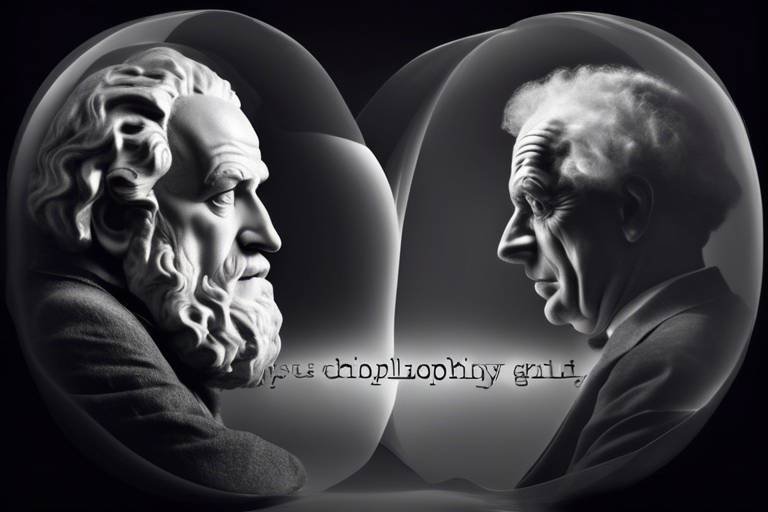Is There a Philosophy of Everything?
Have you ever pondered the big questions in life? You know, the ones that make you stop and think, "What is the meaning of it all?" or "Is there a grand design behind existence?" This article dives into the intriguing concept of a universal philosophy—an idea that suggests there might be a cohesive framework capable of explaining all aspects of existence. Imagine a tapestry woven from the threads of various disciplines, beliefs, and experiences, all coming together to form a complete picture. Sounds fascinating, right? But is such a philosophy even possible? Let's explore this captivating notion, examining its implications, the arguments for and against it, and the perspectives of notable philosophers who have ventured into this expansive discourse.
To grasp the idea of a universal philosophy, it's essential to understand what it truly entails. At its core, a universal philosophy seeks to offer a comprehensive explanation of reality—one that encompasses not just the physical world, but also the metaphysical, ethical, and existential dimensions of our lives. Think of it as a Swiss Army knife for understanding existence; it’s designed to tackle a multitude of questions and scenarios, providing insights that are both profound and practical. This philosophy is characterized by its ambition to unify diverse fields of knowledge, including science, religion, art, and ethics, into a singular framework that can make sense of the complexities of life.
Throughout history, various philosophers have attempted to articulate a philosophy of everything, each adding their unique flavor to the conversation. From ancient wisdom to modern thought, these thinkers have grappled with the fundamental nature of existence. Let's take a closer look at some key figures and their contributions to this expansive discourse.
Eastern philosophies, such as Buddhism and Taoism, offer unique insights into universal truths. These traditions often emphasize harmony, balance, and the interconnectedness of all things. For instance, Buddhism teaches that understanding the nature of suffering is crucial for achieving enlightenment, while Taoism promotes the idea of living in accordance with the Tao, or the fundamental nature of the universe. Both philosophies encourage a holistic view of existence, suggesting that a universal philosophy can be found in the acceptance of life's impermanence and the pursuit of balance.
Zen philosophy, a branch of Buddhism, emphasizes direct experience and intuition over theoretical knowledge. It invites individuals to engage with the present moment, fostering a deep awareness of existence. In this sense, Zen contributes to the understanding of a philosophy of everything by encouraging us to look beyond intellectual abstractions and embrace the simplicity of being. It's akin to peeling an onion; each layer reveals deeper truths about ourselves and the universe, bringing us closer to a unified understanding.
Taoism presents a holistic view of existence that aligns well with the idea of a universal philosophy. Central to Taoist thought is the concept of the Tao, which represents the natural order of the universe. By recognizing the interconnectedness of all things, Taoism encourages us to flow with the rhythms of life rather than resist them. This approach can be likened to dancing with the universe—when we align ourselves with its movements, we gain a deeper understanding of our place within it.
Western philosophers have also grappled with the idea of a comprehensive philosophy. Thinkers like Aristotle, Descartes, and Hegel have sought to articulate frameworks that encompass the entirety of human experience. While their approaches vary, they share a common goal: to make sense of the complexities of existence through reason and logic. This quest for understanding often leads to debates about the nature of reality, the existence of a higher power, and the essence of human consciousness.
Proponents of a universal philosophy present compelling arguments in favor of its existence. They suggest that having a cohesive framework can lead to a more profound understanding of reality. For instance, a universal philosophy can integrate various fields of knowledge, allowing us to see connections that we might otherwise overlook. This integration can be incredibly beneficial, as it encourages interdisciplinary collaboration and fosters innovative thinking.
Imagine a world where scientists, artists, and philosophers collaborate to solve the pressing issues of our time. A universal philosophy can serve as a bridge, connecting disparate fields and allowing for a more comprehensive exploration of complex questions. By integrating knowledge from various domains, we can develop a richer understanding of existence and the challenges we face.
A comprehensive philosophy can also help address fundamental existential questions. What is our purpose? Why do we exist? How do we find meaning in our lives? By providing clarity on these issues, a universal philosophy can empower individuals to navigate life's uncertainties with greater confidence and purpose. It's like having a compass in a dense fog; it guides us through the murky waters of existence, helping us find our way.
Despite the allure of a philosophy of everything, critics argue against its feasibility. They point out that existence is inherently complex, making a singular philosophy problematic. The subjective nature of human experience raises questions about whether a universal philosophy can truly capture the richness of life. After all, each person's journey is unique, shaped by their experiences, beliefs, and cultural backgrounds.
The complexity of existence poses significant challenges for a universal philosophy. Life is not a simple equation with a single solution; it’s a multifaceted tapestry woven from countless threads. This complexity means that any attempt to create a one-size-fits-all philosophy may ultimately fall short, as it risks oversimplifying the rich diversity of human experience.
The subjective nature of human experience further complicates the notion of a universal philosophy. Each individual interprets the world through their unique lens, shaped by personal experiences and cultural contexts. This raises important questions about the validity of a comprehensive approach. Can one philosophy truly encompass the myriad ways in which we understand existence? Perhaps, in our quest for understanding, we must embrace the diversity of perspectives rather than seek a singular truth.
- What is a philosophy of everything? A philosophy of everything seeks to provide a comprehensive framework for understanding all aspects of existence.
- Can a universal philosophy truly exist? While many philosophers argue for its feasibility, critics highlight the complexity and subjectivity of human experience as significant challenges.
- How do Eastern philosophies contribute to this idea? Eastern philosophies like Buddhism and Taoism offer holistic views that emphasize interconnectedness and harmony, enriching the discourse on universal philosophy.
- What are the benefits of having a universal philosophy? A universal philosophy can integrate knowledge across various fields, address existential questions, and foster a deeper understanding of reality.

The Nature of Universal Philosophy
Understanding universal philosophy is akin to embarking on a grand adventure through the vast landscape of human thought. At its core, universal philosophy seeks to answer the fundamental questions of existence, aiming to create a cohesive framework that encompasses all aspects of life, reality, and the universe. Imagine it as a grand tapestry, where each thread represents a different facet of understanding—science, ethics, metaphysics, and art, all woven together to create a complete picture of existence.
To truly grasp what a universal philosophy entails, we must first define its essential characteristics. A philosophy that claims to be universal is not just an abstract concept; it is a living, breathing entity that evolves with human understanding. It should be:
- Inclusive: Embracing various perspectives and fields of knowledge.
- Adaptive: Evolving as new discoveries and insights emerge.
- Comprehensive: Addressing the full spectrum of human experience, from the scientific to the spiritual.
In essence, universal philosophy is the quest for a unified understanding of life’s complexities. It challenges individuals to look beyond the surface and seek connections between seemingly disparate ideas. The beauty of this pursuit lies in its ability to foster dialogue and collaboration across different disciplines. It encourages us to ask questions like, “What is the nature of reality?” and “How do our beliefs shape our experiences?”
Moreover, universal philosophy serves as a bridge between the objective and the subjective. It acknowledges that while there are universal truths—laws of nature, for example—our interpretations of these truths can vary widely based on cultural, social, and personal contexts. This duality is what makes the exploration of universal philosophy both challenging and enriching.
As we delve deeper into this subject, we find that the implications of a universal philosophy extend far beyond academia. It can influence our everyday lives, shaping our values, guiding our decisions, and impacting our interactions with others. The pursuit of a universal philosophy encourages a sense of interconnectedness, reminding us that we are all part of a larger narrative. Just as a single drop of water contributes to the vastness of an ocean, each individual's perspective adds depth to the collective human experience.
In conclusion, the nature of universal philosophy is a profound exploration of existence, identity, and understanding. It invites us to ponder the big questions while appreciating the intricate details that make life so beautifully complex. As we navigate through this philosophical journey, we may find ourselves not only seeking answers but also embracing the questions that propel us forward.

Historical Perspectives
Throughout the annals of human thought, the quest for a universal philosophy has captivated the minds of many. From the ancient sages of the East to the rationalists of the West, philosophers have grappled with the profound questions of existence, reality, and the essence of being. This journey through history reveals a tapestry of ideas that reflect humanity's ongoing struggle to understand itself and the universe. Each philosopher, like a unique thread, contributes to the rich fabric of philosophical discourse, leading us toward a more coherent understanding of a philosophy of everything.
In the Eastern philosophical traditions, figures such as Confucius, Laozi, and the Buddha have laid the groundwork for comprehensive worldviews that encompass ethics, existence, and the nature of reality. For instance, Buddhism offers insights into the transient nature of existence and the interconnectedness of all things. The Four Noble Truths and the Eightfold Path provide a framework for understanding suffering and the path to enlightenment, suggesting a universal approach to existential dilemmas.
On the other hand, Taoism introduces the concept of the Tao, or "the way," which emphasizes harmony with the natural order. This philosophy encourages individuals to align themselves with the flow of the universe, promoting a holistic view of existence that resonates with the idea of a universal philosophy. The teachings of Laozi and Zhuangzi invite us to reflect on the simplicity and complexity of life, illustrating how these ancient traditions contribute to the broader discourse on a philosophy of everything.
Meanwhile, in the Western tradition, philosophers such as Plato, Aristotle, and Descartes have also sought to articulate a comprehensive understanding of existence. Plato's Theory of Forms posits that the material world is merely a shadow of a higher reality, suggesting that true knowledge lies beyond mere sensory experience. Aristotle, with his empirical approach, laid the groundwork for scientific inquiry, emphasizing the importance of observation and categorization in understanding the world around us.
As we delve deeper into the historical perspectives of universal philosophy, we encounter the Enlightenment thinkers, whose rationalist approaches sought to unify knowledge across various domains. Figures like Immanuel Kant attempted to synthesize metaphysics, ethics, and aesthetics into a cohesive framework, highlighting the interconnectedness of different fields of thought. This quest for unity in diversity continues to resonate in contemporary philosophical discussions, as we strive to integrate insights from various disciplines into a singular understanding of existence.
In summary, the historical perspectives on a philosophy of everything reveal a rich and diverse landscape of thought. From Eastern traditions that emphasize harmony and interconnectedness to Western philosophies that prioritize reason and empirical inquiry, each contribution adds depth to our understanding of existence. As we reflect on these historical insights, we can appreciate the ongoing dialogue that shapes our quest for a universal philosophy, inviting us to explore the profound questions that define our humanity.
- What is a universal philosophy? A universal philosophy seeks to explain all aspects of existence, integrating various fields of knowledge into a cohesive framework.
- Which philosophers contributed to the idea of a philosophy of everything? Notable philosophers include Confucius, Laozi, the Buddha, Plato, Aristotle, and Immanuel Kant, among others.
- How do Eastern philosophies differ from Western philosophies in this context? Eastern philosophies often emphasize interconnectedness and harmony with nature, while Western philosophies may focus on reason and empirical evidence.

Eastern Philosophical Traditions
Eastern philosophical traditions, including Buddhism and Taoism, offer profound insights into the nature of existence and the pursuit of universal truths. These philosophies often emphasize harmony, balance, and the interconnectedness of all things, presenting a refreshing contrast to the more analytical and often fragmented approaches found in Western thought. At the core of these traditions is the belief that understanding life requires a holistic perspective, one that transcends mere intellectual reasoning and taps into a deeper, experiential knowledge.
For instance, in Buddhism, the concept of interdependence suggests that all phenomena arise in relation to one another, challenging the notion of isolated existence. This interconnectedness is beautifully illustrated in the Buddhist teaching of the Four Noble Truths, which outline the nature of suffering and the path to liberation. By recognizing that our experiences are intricately linked to the experiences of others, Buddhism encourages us to cultivate compassion and mindfulness, which are essential for grasping the broader tapestry of life.
Taoism, on the other hand, offers a unique approach to understanding existence through the lens of natural harmony. The foundational text of Taoism, the Tao Te Ching, emphasizes living in accordance with the Tao, or the fundamental principle that underlies and unites all things. This philosophy teaches that by aligning ourselves with the natural flow of the universe, we can achieve a state of balance and peace. The idea of wu wei, or effortless action, encapsulates this concept, suggesting that sometimes the best way to navigate life is to go with the flow rather than resist it.
Both traditions highlight the importance of direct experience and intuition in the quest for understanding. Zen Buddhism, a branch of Buddhism, particularly emphasizes the value of meditative practice as a means to attain insight. Through meditation, practitioners aim to quiet the mind and experience reality as it is, free from the distortions of preconceived notions and attachments. This direct engagement with existence fosters a profound sense of awareness and connection, reinforcing the idea that a universal philosophy is not merely a theoretical construct but a lived experience.
In summary, Eastern philosophical traditions provide a rich and nuanced perspective on the concept of a universal philosophy. By focusing on the interconnectedness of all things and emphasizing experiential knowledge, these traditions offer valuable insights that can help us better understand the complexities of existence. They challenge us to look beyond surface-level distinctions and recognize the deeper unity that binds us all together.
- What is the main focus of Eastern philosophies? Eastern philosophies primarily emphasize interconnectedness, harmony, and experiential knowledge, contrasting with more analytical approaches found in Western thought.
- How does Buddhism contribute to the idea of a universal philosophy? Buddhism teaches interdependence and compassion, suggesting that understanding life requires recognizing our connections with others.
- What role does Taoism play in understanding existence? Taoism promotes living in harmony with the natural flow of the universe, emphasizing balance and the principle of effortless action.

Zen Philosophy
Zen philosophy, often regarded as a profound and minimalist approach to understanding existence, invites us to experience life directly rather than through the lens of complex theories or ideologies. At its core, Zen emphasizes direct experience and the importance of being present in the moment. This philosophy encourages individuals to strip away the distractions of everyday life and to engage with the world as it is, fostering a sense of clarity and awareness. In a world filled with noise and chaos, Zen offers a refreshing perspective that resonates deeply with those seeking a more meaningful existence.
One of the most captivating aspects of Zen philosophy is its use of koans—paradoxical anecdotes or riddles that challenge conventional thinking. These koans serve as tools for meditation, pushing practitioners to transcend logical reasoning and tap into a deeper understanding of reality. For instance, the famous koan "What is the sound of one hand clapping?" invites us to question our perceptions and assumptions about duality and existence. By grappling with such questions, Zen practitioners cultivate a state of mind that is open, inquisitive, and free from preconceived notions.
Furthermore, Zen philosophy teaches that enlightenment is not a distant goal to be achieved but rather an innate state of being that can be realized in everyday life. This idea is beautifully encapsulated in the Zen saying, "Before enlightenment, chop wood, carry water. After enlightenment, chop wood, carry water." It implies that the mundane tasks of life hold the same significance as profound spiritual experiences. By embracing this perspective, individuals can find joy and meaning in their daily routines, transforming the ordinary into the extraordinary.
Zen also emphasizes the importance of meditation as a practice for cultivating mindfulness and awareness. Through meditation, practitioners learn to observe their thoughts and feelings without attachment, allowing them to gain insight into the nature of their own minds. This practice not only fosters a sense of inner peace but also enhances one's ability to engage with the world more authentically. In essence, Zen philosophy invites us to live fully in the present moment, appreciating the beauty and impermanence of life.
In summary, Zen philosophy offers a unique contribution to the discourse on a universal philosophy by advocating for direct experience, challenging conventional thought through koans, and emphasizing the significance of mindfulness. Its teachings encourage individuals to seek understanding not through abstract concepts but through personal experience and presence. As we explore the vast landscape of philosophical thought, Zen serves as a reminder that sometimes the simplest truths can lead to the most profound insights.
- What is Zen philosophy? Zen philosophy is a school of thought that emphasizes direct experience, mindfulness, and living in the present moment. It encourages individuals to engage with life as it is, rather than through complex theories.
- How does Zen use koans? Koans are paradoxical riddles used in Zen practice to challenge conventional thinking and provoke deeper understanding. They serve as tools for meditation and self-reflection.
- Is enlightenment a goal in Zen? In Zen, enlightenment is viewed as an innate state of being that can be realized in everyday life, rather than a distant goal to be achieved.
- What role does meditation play in Zen? Meditation is a crucial practice in Zen philosophy that helps cultivate mindfulness, awareness, and insight into the nature of one's thoughts and feelings.

Taoist Principles
Taoism, an ancient Chinese philosophy, offers profound insights into the nature of existence and the interconnectedness of all things. At its core, Taoism emphasizes the concept of the Tao, often translated as "the Way." This principle serves as the ultimate source of all reality, guiding the natural order of the universe. Imagine the Tao as a river, flowing effortlessly through landscapes, shaping and being shaped by its surroundings. Just like this river, Taoism encourages individuals to align themselves with the natural flow of life rather than resist it.
One of the fundamental tenets of Taoism is the idea of wu wei, or "non-action." This doesn't imply inaction but rather suggests a state of effortless doing. It’s akin to a skilled dancer who moves fluidly, responding to the rhythm of the music without forcing their steps. In the context of a universal philosophy, wu wei highlights the importance of embracing spontaneity and allowing things to unfold naturally. By adopting a mindset of non-resistance, individuals can cultivate a deeper understanding of their place in the cosmos.
Taoism also promotes the concept of yin and yang, representing the duality and balance inherent in all aspects of existence. This principle suggests that opposites are interconnected and interdependent, much like day and night or light and dark. In the framework of a universal philosophy, recognizing the interplay of yin and yang encourages a holistic view of reality, where every phenomenon is seen as part of a greater whole. This perspective can lead to a more profound appreciation for the complexity and beauty of life.
Moreover, Taoist principles encourage a deep respect for nature and the environment. The belief that humans are an integral part of the natural world fosters a sense of responsibility toward ecological balance. In a philosophy of everything, this respect for nature can be seen as a guiding principle, urging humanity to live in harmony with the earth. By understanding our connection to the environment, we can develop sustainable practices that honor the delicate web of life.
In conclusion, Taoist principles provide a rich framework for understanding a universal philosophy. By embracing the flow of the Tao, practicing wu wei, recognizing the balance of yin and yang, and respecting nature, individuals can cultivate a deeper awareness of existence. These insights not only enrich personal understanding but also contribute to a more cohesive worldview that celebrates the interconnectedness of all things.
- What is the Tao? The Tao is the fundamental principle that underlies the universe in Taoism, symbolizing the natural order and flow of life.
- What does wu wei mean? Wu wei translates to "non-action," emphasizing the importance of aligning with the natural flow of life rather than forcing actions.
- How does yin and yang relate to Taoism? Yin and yang represent the duality and balance of opposite forces in the universe, highlighting their interdependence.
- Why is nature important in Taoism? Taoism teaches that humans are part of the natural world, promoting respect and responsibility towards the environment.

Western Philosophical Contributions
When we dive into the realm of Western philosophy, we find a rich tapestry woven by some of the greatest thinkers in history. From ancient Greece to modern times, philosophers have grappled with the concept of a universal philosophy, each adding their unique insights and arguments. Think of it like a grand symposium where each philosopher is a guest speaker, presenting their perspective on the nature of existence and our place within it.
One of the earliest contributors to this dialogue was Socrates, who famously proclaimed that "the unexamined life is not worth living." His method of questioning not only laid the groundwork for critical thinking but also encouraged individuals to seek a deeper understanding of their existence. Socratic questioning invites us to peel back the layers of our beliefs and assumptions, urging us to consider whether a universal philosophy could unify our understanding of life.
Following Socrates, Plato introduced the idea of ideal forms, suggesting that the material world is merely a shadow of a higher reality. For Plato, the pursuit of knowledge and truth was paramount, and he believed that by understanding these forms, we could grasp the essence of existence itself. His allegory of the cave illustrates how most people live in ignorance, mistaking shadows for reality. This raises the question: could a universal philosophy help illuminate the truth hidden in the shadows of our perceptions?
Then we have Aristotle, a student of Plato, who took a more empirical approach. He emphasized observation and categorization, laying the foundation for scientific inquiry. Aristotle's belief in the "Golden Mean" suggests that virtue lies in moderation, which can be seen as a guiding principle in the search for a universal philosophy. His works encourage us to explore the interconnectedness of all things, hinting at a cohesive understanding of existence that transcends individual disciplines.
As we move through the ages, we encounter Immanuel Kant, who sought to reconcile rationalism and empiricism. His "Critique of Pure Reason" challenged the limits of human understanding and posited that our experiences shape our knowledge of the world. Kant's ideas suggest that a universal philosophy must account for both the subjective nature of human experience and the objective reality we strive to understand. This duality raises intriguing questions about the feasibility of a one-size-fits-all philosophy.
In more recent times, philosophers like Friedrich Nietzsche and Martin Heidegger have contributed to this discourse by challenging traditional notions of meaning and existence. Nietzsche's declaration that "God is dead" reflects a profound existential crisis, prompting us to create our own values and meanings in a seemingly indifferent universe. Heidegger, on the other hand, invites us to contemplate our being-in-the-world, emphasizing the importance of authenticity and individual experience. Their contributions highlight the complexity of creating a universal philosophy in a world filled with diverse perspectives and existential dilemmas.
In summary, Western philosophical contributions to the idea of a universal philosophy are rich and varied. Each thinker has added layers of complexity, offering different lenses through which to view existence. While some argue for a cohesive framework that unites all knowledge, others remind us of the inherent diversity and subjectivity of human experience. Ultimately, the quest for a philosophy of everything is not just an academic exercise; it’s a deeply personal journey that invites us to reflect on our beliefs, values, and the very nature of reality itself.

Arguments For a Philosophy of Everything
The debate surrounding a philosophy of everything is not merely academic; it touches the very essence of our existence. Proponents of this idea present several compelling arguments that advocate for the necessity of a cohesive philosophical framework. Imagine trying to navigate a vast ocean without a map—this is how many feel when confronting life's complexities without a guiding philosophy. A universal philosophy can serve as that map, providing direction and understanding in a chaotic world.
One of the most significant arguments in favor of a universal philosophy is its ability to integrate knowledge across various fields. Think about it: science, art, ethics, and spirituality all seek to answer the same fundamental questions about existence, yet they often operate in silos. A comprehensive philosophy can bridge these gaps, creating a tapestry of understanding that weaves together insights from different disciplines. For instance, consider the following table that illustrates how various fields can converge under a universal philosophy:
| Field | Key Questions | Philosophical Insights |
|---|---|---|
| Science | What is the nature of reality? | Understanding the universe through empirical evidence. |
| Art | What is beauty? | Exploring human experience and emotion. |
| Ethics | What is the right way to live? | Defining morality and human values. |
| Spirituality | What is our purpose? | Seeking connection and meaning beyond the material. |
By examining these intersections, we can appreciate how a universal philosophy not only enriches our understanding but also enhances our ability to communicate across disciplines. It fosters a sense of unity in diversity, allowing us to tackle complex issues collaboratively.
Another compelling argument is that a comprehensive philosophy helps address existential questions that have puzzled humanity for centuries. Questions like “What is the meaning of life?” or “Why do we suffer?” are not just philosophical musings; they are central to the human experience. A unified philosophical framework can provide clarity and insight into these profound questions, offering comfort and direction. For many, it acts as a lighthouse in the fog, illuminating the path toward understanding one's purpose and place in the universe.
Furthermore, a philosophy of everything encourages critical thinking and self-reflection. In a world bombarded with information, having a philosophical lens through which to analyze our experiences can empower individuals to make more informed decisions. It fosters a mindset of inquiry, prompting us to ask deeper questions about our beliefs, values, and actions. This process of reflection can lead to personal growth and a more meaningful life.
In conclusion, the arguments for a philosophy of everything are rooted in its potential to integrate knowledge, address existential questions, and promote critical thinking. While the journey toward such a comprehensive understanding may be fraught with challenges, the benefits it offers are too significant to ignore. As we continue to explore the depths of existence, a universal philosophy may very well be the key to unlocking the mysteries of life.
- What is a philosophy of everything? A philosophy of everything aims to provide a comprehensive framework that explains all aspects of existence, integrating various fields of knowledge.
- Why is it important? It helps us understand complex issues, addresses fundamental existential questions, and fosters critical thinking.
- Can such a philosophy truly exist? While critics argue about its feasibility, proponents believe that striving for a universal philosophy can lead to greater understanding and unity.
- How can I apply this philosophy in daily life? By reflecting on your beliefs and values, and seeking connections between different areas of knowledge, you can start to develop your own understanding of a philosophy of everything.

Integration of Knowledge
When we talk about the , we're diving into a fascinating realm where different fields of study converge to create a more holistic understanding of our existence. Imagine standing at the center of a vast web, where each thread represents a distinct area of knowledge—science, philosophy, art, and spirituality—all intertwined. This interconnectedness is not just a beautiful metaphor; it’s a vital aspect of developing a universal philosophy. By weaving together insights from various disciplines, we can uncover deeper truths about life, the universe, and everything in between.
Consider how the scientific method has shaped our understanding of the world. It provides us with tools to dissect and analyze the natural phenomena around us. Yet, when we pair scientific inquiry with philosophical reflection, we begin to ask the big questions: What does it mean to exist? What is our purpose? This synergy between science and philosophy exemplifies how integrating knowledge can lead to profound insights.
Moreover, the arts play a crucial role in this integration. They offer a unique lens through which we can explore human experience and emotion. For instance, literature and visual arts often capture the essence of our existential struggles, providing context and depth that pure data cannot convey. This interplay of disciplines not only enriches our understanding but also fosters empathy and connection among individuals.
To illustrate this point, let’s consider a few key areas where integration is particularly impactful:
- Science and Ethics: As scientific advancements accelerate, ethical considerations become paramount. Questions surrounding genetic engineering, artificial intelligence, and environmental sustainability necessitate a philosophical framework to guide our decisions.
- Psychology and Philosophy: The study of the mind benefits immensely from philosophical inquiry. Understanding concepts like consciousness and free will requires a blend of psychological insights and philosophical reasoning.
- Spirituality and Science: Many find that scientific discoveries about the universe resonate with spiritual beliefs, creating a rich dialogue between the two realms.
Ultimately, the integration of knowledge fosters a more comprehensive worldview. It encourages us to break down silos and engage in interdisciplinary dialogue, leading to richer discussions and innovative solutions to complex problems. In a world increasingly characterized by specialization, the call for a universal philosophy becomes even more urgent. By embracing a holistic approach, we not only enhance our understanding of existence but also cultivate a sense of unity in our diverse experiences.
Q1: What is a universal philosophy?
A universal philosophy seeks to provide a comprehensive framework that explains all aspects of existence, integrating insights from various disciplines to form a cohesive understanding of reality.
Q2: How can different fields of knowledge work together?
Different fields can collaborate by sharing methodologies, insights, and perspectives, allowing for a richer exploration of complex questions and problems that affect multiple areas of study.
Q3: Why is the integration of knowledge important?
Integrating knowledge is important because it helps us address complex existential questions, fosters innovation, and promotes a more profound understanding of the interconnectedness of life.

Addressing Existential Questions
When we dive into the depths of a universal philosophy, one of the most compelling aspects is its ability to tackle those nagging existential questions that have haunted humanity for centuries. Questions like, “What is the meaning of life?” or “Why are we here?” can feel like heavy weights on our shoulders, but a cohesive philosophical framework can provide clarity and insight. Imagine trying to solve a jigsaw puzzle without having the picture on the box; it’s challenging, right? A universal philosophy acts like that picture, giving us a guideline to understand our existence and the world around us.
One of the primary benefits of a philosophy of everything is its potential to unify various fields of knowledge, from science to art, and everything in between. This integration can lead to a more profound understanding of our place in the universe. For instance, consider how different disciplines like psychology, sociology, and even physics contribute to our grasp of human existence. When woven together, they create a rich tapestry that not only answers existential questions but also enriches our understanding of life itself.
A universal philosophy can also help us confront the big questions by providing a framework within which we can explore them. It encourages us to ask not just “What is my purpose?” but also “How do I fit into the larger narrative of existence?” This perspective can lead to a more fulfilling life, as it fosters a sense of belonging and connection to something greater than ourselves. By addressing existential questions, we can cultivate a deeper awareness of our actions and their impact on the world.
Moreover, addressing these questions isn't just an academic exercise; it can have real-world implications. For example, when individuals find meaning in their lives, they are often more motivated to contribute positively to society. This can lead to greater social cohesion and a collective sense of purpose. In essence, a philosophy of everything can illuminate the path toward personal and communal fulfillment.
However, it's essential to acknowledge that these existential inquiries can be deeply personal and subjective. What resonates with one person may not hold the same significance for another. This subjectivity is where the beauty of a universal philosophy shines—by offering a broad framework that respects individual interpretations while still providing a common ground for exploration.
In conclusion, addressing existential questions through a universal philosophy not only enriches our understanding of life but also empowers us to navigate the complexities of existence with greater confidence. It's like having a compass in the wilderness; it doesn’t tell you exactly where to go, but it helps you find your direction amidst the chaos.
- What is a universal philosophy? A universal philosophy is a framework that seeks to explain all aspects of existence, integrating various fields of knowledge and addressing fundamental questions about life and purpose.
- Can a universal philosophy answer all existential questions? While it may not provide definitive answers for everyone, it offers a broad perspective that can help individuals explore and find meaning in their lives.
- How does a universal philosophy impact society? By fostering a sense of belonging and connection, it can motivate individuals to contribute positively to their communities and enhance social cohesion.

Critiques and Challenges
When diving into the concept of a universal philosophy, it’s impossible to ignore the that arise. Critics argue that the very idea of a philosophy that encompasses everything is not only overly ambitious but also fundamentally flawed. One of the primary concerns is the complexity of existence. Life, as we know it, is a tapestry woven from countless threads of experience, emotion, and circumstance. Each thread represents a unique aspect of existence, making it incredibly difficult, if not impossible, to distill everything into a single, cohesive philosophy.
Moreover, the subjective nature of human experience poses a significant challenge. What one person perceives as truth may differ vastly from another's understanding. This subjectivity and interpretation raise profound questions about the validity of a universal philosophy. Imagine trying to paint a picture that accurately represents the feelings of every individual in a crowded room. The resulting image would be a chaotic blend of colors and shapes, reflecting the myriad interpretations of reality.
To further illustrate this point, consider the following table that summarizes the main critiques of a universal philosophy:
| Critique | Description |
|---|---|
| Complexity of Existence | Existence is multifaceted, making it challenging to encapsulate all experiences within a single philosophy. |
| Subjectivity | Individual interpretations of reality vary widely, complicating the establishment of a universal truth. |
| Dynamic Nature of Knowledge | As knowledge evolves, a static philosophy may become outdated or irrelevant. |
| Cultural Differences | Diverse cultural backgrounds lead to different philosophical approaches, challenging the idea of universality. |
In addition to these critiques, there’s the issue of the dynamic nature of knowledge. What we understand today may be vastly different from what we will discover tomorrow. A philosophy that claims to explain everything might quickly become obsolete as new insights emerge. This raises the question: can any philosophy truly claim to be universal when knowledge is always in flux?
Lastly, we cannot overlook the impact of cultural differences. Philosophical thought is deeply influenced by cultural contexts. A philosophy that resonates in one culture may not hold the same weight in another. This diversity in thought further complicates the quest for an all-encompassing philosophy, suggesting that perhaps the search for a universal truth is a journey rather than a destination.
In conclusion, while the idea of a universal philosophy is enticing, the critiques and challenges it faces are substantial. The complexity of existence, the subjective nature of experience, the dynamic evolution of knowledge, and cultural differences all contribute to a rich tapestry of thought that resists simplification. As we navigate these philosophical waters, it becomes clear that rather than seeking a definitive answer, we might be better off embracing the questions themselves.
- What is a universal philosophy?
A universal philosophy aims to explain all aspects of existence, integrating various fields of knowledge into a cohesive framework. - Who are some key philosophers that contributed to this idea?
Notable figures include Aristotle, Confucius, and various Eastern philosophers like Laozi and Buddha. - What are the main critiques of a universal philosophy?
The critiques include the complexity of existence, subjectivity of experience, and cultural differences. - Can a universal philosophy evolve over time?
Yes, as knowledge and cultural contexts change, a universal philosophy may also need to adapt to remain relevant.

Complexity of Existence
The complexity of existence is a profound concept that challenges the very foundation of a universal philosophy. Imagine trying to capture the essence of a vast ocean in a single bottle; this is akin to the challenge faced by any philosophy that seeks to explain everything. Existence is not just a simple equation or a straightforward narrative; it is a tapestry woven from countless threads of experiences, emotions, and phenomena. Each thread represents a different aspect of life, from the mundane to the extraordinary, and together they create a rich, intricate design that defies easy understanding.
One of the core reasons why existence is so complex is the sheer diversity of perspectives that arise from individual experiences. Each person perceives the world through their unique lens, shaped by their culture, upbringing, and personal encounters. This subjectivity leads to a multitude of interpretations and beliefs about reality. For instance, two people might witness the same event but derive entirely different meanings from it. This divergence raises a critical question: How can a single philosophy encompass such a wide range of human experiences and interpretations?
Furthermore, the interplay of various disciplines adds another layer of complexity. Consider the relationship between science, art, philosophy, and spirituality. Each field offers its own insights and methodologies for understanding existence, yet they often arrive at conflicting conclusions. For example, while science relies on empirical evidence and rationality, art embraces emotion and intuition. This disparity makes it challenging to develop a cohesive philosophical framework that can unify these diverse approaches.
Moreover, the dynamic nature of existence itself cannot be overlooked. Life is in a constant state of flux; what holds true today may not necessarily apply tomorrow. This impermanence is a fundamental aspect of existence that complicates the quest for universal truths. A philosophy that attempts to define everything must grapple with the reality that change is the only constant. How can one philosophy adequately address the evolving nature of life and the universe?
In light of these complexities, it becomes evident that a philosophy of everything may not only be ambitious but also inherently problematic. The intricate web of existence resists simplification, and attempting to do so may lead to oversimplified conclusions that fail to capture the richness of human experience. As we ponder the possibilities of a universal philosophy, we must remain aware of the limitations imposed by the complexity of existence itself.
- What is a universal philosophy? A universal philosophy seeks to provide a comprehensive framework for understanding all aspects of existence, integrating various fields of knowledge and perspectives.
- Why is existence considered complex? Existence is complex due to the diversity of individual experiences, the interplay of different disciplines, and the dynamic nature of life itself.
- Can a single philosophy explain everything? While a single philosophy may attempt to explain everything, the inherent complexity and subjectivity of existence make it a challenging endeavor.
- How do different disciplines contribute to our understanding of existence? Different disciplines, such as science, art, and philosophy, offer unique insights and methodologies, enriching our overall understanding of existence.

Subjectivity and Interpretation
The concept of a universal philosophy faces significant challenges, primarily due to the inherent subjectivity of human experience. Each individual perceives the world through their unique lens, shaped by personal beliefs, cultural backgrounds, and emotional states. This raises a crucial question: can a single philosophy truly encompass the diverse interpretations of existence? The answer is complex and multifaceted.
To illustrate this point, consider how two people can witness the same event yet describe it in entirely different ways. One might see a beautiful sunset as a moment of peace and reflection, while another may view it as a reminder of the fleeting nature of life. These differing interpretations highlight the limitations of a universal philosophy, as it struggles to account for the vast array of human perspectives.
Moreover, the subjective nature of interpretation means that what resonates deeply with one person may not hold the same weight for another. For instance, in the realm of art, a piece can evoke joy in one viewer and sadness in another, depending on their personal experiences and emotional states. This variability complicates the idea of a cohesive philosophical framework that applies universally.
Furthermore, the evolution of language and cultural expressions adds another layer of complexity. Words and symbols carry different meanings across cultures, leading to potential misunderstandings. A philosophy that seeks to be universal must grapple with these linguistic and cultural differences, which can often create barriers to shared understanding.
While the desire for a comprehensive philosophy is noble, it is essential to acknowledge that human experience is not only subjective but also dynamic. Our interpretations can shift over time, influenced by new experiences and insights. This fluidity makes it challenging to pin down a singular philosophy that can claim to explain everything. Instead, we may find that a more pluralistic approach, one that embraces multiple perspectives, could be more beneficial in understanding the complexities of existence.
In conclusion, the subjectivity and interpretation of human experience present formidable challenges to the idea of a universal philosophy. While it is tempting to seek a singular truth, the richness of varied perspectives offers a more profound understanding of our existence. Embracing this diversity may ultimately lead us to a more meaningful exploration of life's mysteries.
- What is a universal philosophy? A universal philosophy attempts to provide a cohesive framework that explains all aspects of existence, integrating knowledge from various fields.
- Why is subjectivity a challenge for universal philosophy? Subjectivity complicates universal philosophy because individual experiences and interpretations can vary widely, making it difficult to establish a single, all-encompassing truth.
- Can a universal philosophy exist? While many philosophers strive for a comprehensive understanding of existence, the complexity and diversity of human experience suggest that a truly universal philosophy may be unattainable.
- How do cultural differences impact philosophical interpretations? Cultural differences influence language, symbols, and values, leading to varied interpretations of philosophical concepts, which can challenge the idea of a universal philosophy.
Frequently Asked Questions
- What is a philosophy of everything?
A philosophy of everything aims to provide a comprehensive framework that explains all aspects of existence. It seeks to integrate various fields of knowledge and address fundamental questions about life, purpose, and reality.
- Who are some key philosophers associated with this concept?
Throughout history, numerous philosophers have contributed to the idea of a universal philosophy. Notable figures include Aristotle, who explored the nature of existence, and Eastern philosophers like Laozi and Buddha, who offered unique insights into the interconnectedness of life.
- How do Eastern philosophies contribute to the philosophy of everything?
Eastern philosophies, such as Buddhism and Taoism, emphasize holistic understanding and direct experience. For instance, Zen philosophy encourages intuition and mindfulness, while Taoism promotes harmony with the universe, both of which enrich the discourse on universal truths.
- What are the benefits of having a universal philosophy?
A cohesive framework helps integrate diverse fields of knowledge, leading to a deeper understanding of existence. It also addresses existential questions, providing clarity about life's purpose, which can be incredibly reassuring in a complex world.
- What challenges does a philosophy of everything face?
Critics argue that the complexity of existence makes it difficult to encapsulate everything within a single philosophy. Additionally, the subjective nature of human experience raises questions about whether a universal approach can truly reflect individual interpretations and insights.
- Can a universal philosophy accommodate different perspectives?
While a universal philosophy aims to provide a broad understanding, it must also consider the diversity of human experience. This can be a balancing act, as integrating various perspectives may challenge the notion of a singular truth.
- Is it possible to achieve a universal philosophy?
While achieving a universally accepted philosophy may be challenging, the pursuit itself can lead to valuable insights and discussions. It encourages collaboration among different schools of thought, promoting a richer understanding of existence.



















